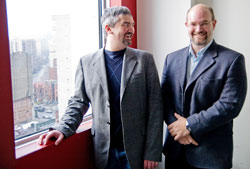Political Science headed in new directions
Department has more registered students than any other across the country

Csaba Nikolenyi (left) and department chair Peter Stoett relax in the Political Science offices on the 12th floor of the Hall Building.
Photo by Rob Maguire
With 1,900 students, Concordia has the largest Political Science department in the country. Last year, it shifted out of a Bishop St. annex into brand new digs on the 12th floor of the Hall Building.
The move was overdue. “We no longer need to stuff professors in broom closets,” joked Chair Peter Stoett.
In addition to the large student population, the department has steadily increased its faculty by two or three professors each year, growing from 12 to 30 tenure-track positions since 1998, which is coincidentally the year Stoett came to Concordia from the University of Guelph. There are also six LTAs (limited term appointments), an ETA (extended term appointment) and five full-time support staff.
The department has assumed the editorship of the Canadian Journal of Political Science (see story) and Concordia houses the secretariat of the International Political Science Association (IPSA). “These two initiatives help to put our name on the map.”
The growth is not abating any time soon. With such a large student population, more professors are needed. Also, the department will add a PhD program in September 2007, and has sent over 200 recruitment posters to academic institutions across North America and Europe. “I’ve already received queries from as far away as China and Africa.”
However, the department only intends to admit half a dozen students. “We’ll resist the urge to rush. These people will be with us for four or five years.”
This theoretical direction complements the practical internships available to students in their Masters in Public Policy and Public Administration (MPPPA) program. Many end up in federal government positions, involved in policy analysis, evaluation and development. “Three-quarters of our students who complete internships are so successful that they are offered full-time positions.” Other masters students pursue a thesis option, reflecting the diversity of the field itself.
Part of the reason for the department’s growth is increasing interest in the various sub-fields within political science. “This is really a sub-field-driven, eclectic discipline, linked by a common fascination with the origins, exercise, and decline of power and influence.”
While there is a growing student interest in globalization, and international and transnational concerns, Stoett’s specialization, international relations, is only one of several sub-fields the department seeks to develop in equal strengths. Professors also research and teach in comparative politics, public policy, political theory, and Quebec and Canadian politics. The department also has a CRC in Comparative Public Policy (see story).
Stoett would like to further enrich the public profile of the department by increasing the number of visiting scholars and research chairs, hiring additional highly qualified and productive faculty, and encouraging Concordia graduates to pursue careers in the world of political administration, political activism, teaching and research. “Ultimately, our students are our most visible outward sign of success.”